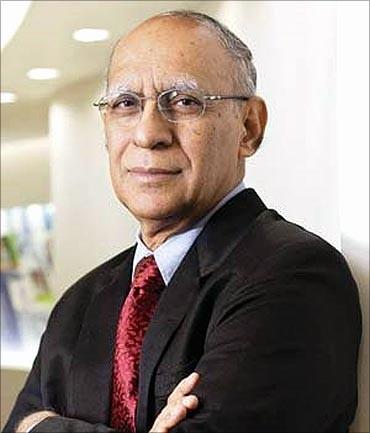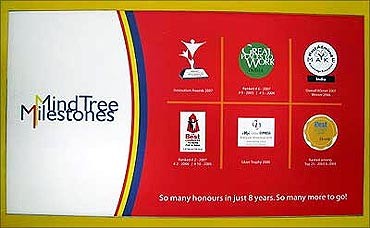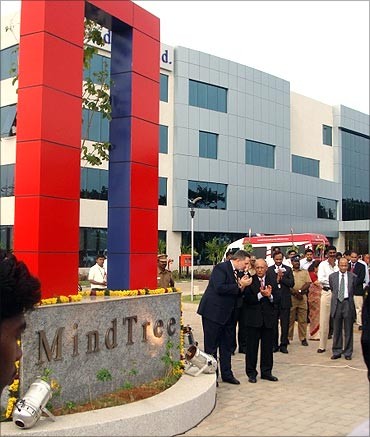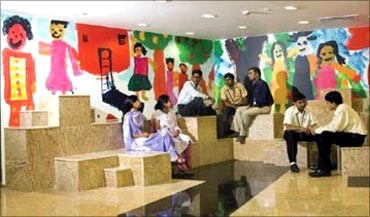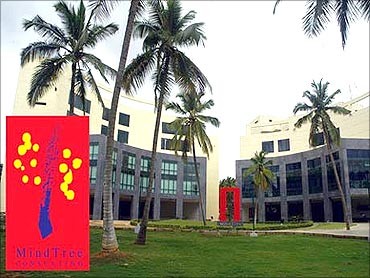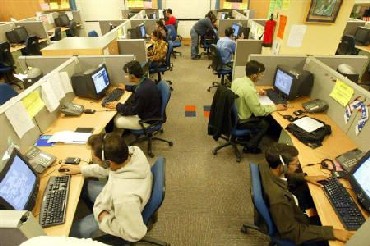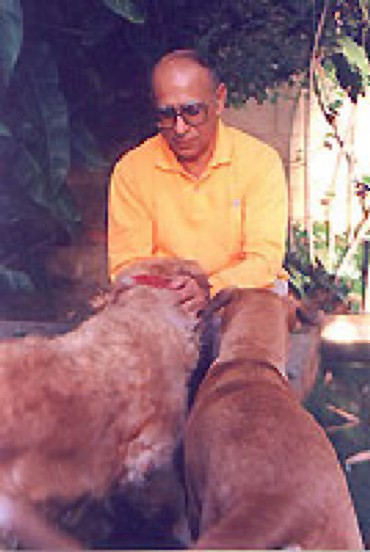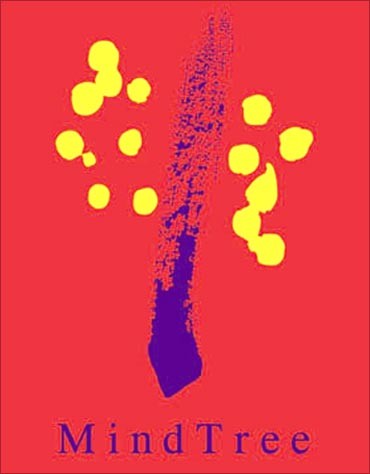 | « Back to article | Print this article |
Ashok Soota on starting from scratch at age 69
Ashok Soota's house overlooks one of the best maintained parks in Bangalore's upmarket Koramangala area. I go there to say hello to his three dogs - both of us are dog lovers - and then we walk across, as it is more sensible to park my car there and not try to find a parking space on the busy street where The Esplanade is located.
Soota, who spent some years in Kolkata earlier in his working life, thinks it a good idea to indulge his taste for Bengali cuisine during the puja season and the place does not disappoint. It mixes tradition with a bit of innovation.
It takes us a while to settle down as we change tables twice in a partially futile attempt to find a quiet corner that does not interfere with the recording of the conversation.
Click NEXT to read more...
Ashok Soota on starting from scratch at age 69
Soota asks the first question: why host a lunch a second time, which is easy to answer as very few decide to start working life anew at 69 to float yet another company.
But he is obviously in his elements and reveals that "people say I am truly in the happiest state of mind as would be appropriate for somebody who has started a company called Happiest Minds."
His sense of adventure spills over into the ordering as we select for starters a relatively unknown chanar cutlet, which turns out to be crumb-fried paneer, firm outside but soft at the core.
The vegetable that I recommend, the classical shukto, is a great hit with him as he loves the flavour of karela and it does clear our pallets for the two fish dishes that follow.
He chooses luchi, as the light puri made out of white flour is called in Bengali, to go with his pabda fish in a curry made of mustard and poppy seed paste. I stick to the traditional hilsa in mustard and steamed rice.
Click NEXT to read more...
Ashok Soota on starting from scratch at age 69
Soota likes my idea of attributing two-and-a-half start ups to him as other than MindTree, in Wipro he did not quite crank things up from the word go but accelerated things to fullness of shape a year after they got started.
In a way, the current experience is unique for him as, for the first time, he has "built the 12-member team of co-founders from scratch".
For MindTree, he met the other co-founders through the VC. He is enjoying himself thoroughly and "excited and very pleased with the team" he has been able to build. Given the depth of experience assembled, he considers it "the strongest start-up team for an IT services company."
Click NEXT to read more...
Ashok Soota on starting from scratch at age 69
The name of the company, Happiest Minds Technologies, unusual by any measure, is rooted in Soota's personal experience.
"I have been researching the subject of happiness, built up a huge library on it. Even when I began to question the purpose of one's life, I zeroed in on this."
Then came the practical part of getting a URL and web address. "We were very lucky. I submitted a list of ten names, all around happiness, joy, and I got past only two, of which Happiest Minds was one, which would have been my first choice."
Not satisfied with being unusual with the name, the team decided to be different with designing the logo too and went in for crowd sourcing.
Click NEXT to read more...
Ashok Soota on starting from scratch at age 69
"We explained to the market the mission behind Happiest Minds. Very simple - happiest people, happiest customers. We also explained the values we articulated that lend themselves to the acronym SMILES - sharing, mindful, integrity, learning, excellence, social responsibility - easy to remember, which goes very well with happiness.
Our first building is called Smiles One. There were over 2,500 design submissions for the logo, many esoteric ones, but we chose a simple one of a happy person. It is a symbol of becoming, belonging and being. We must be the only company in the world that has created a position called Happiness Evangelist. There will be a programme that will enable happiness, both for our people and customers."
He thinks "this is a great time to begin. In 1999, dozens of companies came up because of the internet boom and many collapsed in the bust. It is rather unusual that in an industry in which there is so much change which gives you the opportunities for entry, hardly any new company has entered, except small niche ones, over the last ten years. There is a perfect storm now of new, disruptive technologies which cause churn, create new demand and a need for new applications."
Click NEXT to read more...
Ashok Soota on starting from scratch at age 69
They have also identified three solutions areas. "One is multi channel commerce, second is a demand-driven supply chain. In these two we intend to develop our own intellectual property. The third is human capital management, for which we want to license the product. We will put up a fairly large development team of 50-plus. In essence, that's the differentiator."
Their first 55,000 sq ft building has a seating capacity of 450 people.
"So, we better fill it fast. We have indicated that in seven years on the outside we want to go public. That's the commitment we have made to our VCs (two term sheets are ready). We have said we will be the fastest company to grow to the first hundred million dollars but that's not good enough. MindTree took six full financial years to do it.& So everybody says we are planning to do it in either six or five. I want to take the company public in six or seven years. I can't do that on a hundred million (It has to be much more). That's the closest I can get to giving you a feel on this."
Click NEXT to read more...
Ashok Soota on starting from scratch at age 69
He recalls that "we've lived through more turbulent times in the last decade than, I'd say, ever before. One good thing I've learnt is, good times don't last forever, and neither do bad times.
So, when things are going hunky dory, you have to be very cautious to prepare for the next downturn, not allow yourself to go overboard. That is what brought all the dotcom, internet services companies down.
So, the word is caution in boom times. In the downturn, don't cut too much, which I believe a lot of IT services companies have done in the recent past.
You need to be preparing for the future at that time so that when the markets open again, you are in a leveraged position."
Click NEXT to read more...
Ashok Soota on starting from scratch at age 69
A second take is, "you have to take decisions based on cash flow. In (acquisitions) the choice is - make versus buy. The make option traditionally looks maybe ten times more attractive financially.
But when you see how much cash it uses up, does it mean I will end up going for my second round two years earlier? Then you ask yourself what's your dilution two years earlier and suddenly realise it is a very expensive proposition. You are really looking at a very finite flow of cash." That old old lesson that cash is king? "Absolutely."
"The third thing I have learnt is that there is nothing more important than the team - bonding, culture, keeping things together. Which is why, even in very difficult times, when you've made a mutual commitment to yourselves, I did not go for a layoff."
Click NEXT to read more...
Ashok Soota on starting from scratch at age 69
So, what happened to his being part of the MindTree team? "I do not want to say anything that is negative about individuals. I could say, okay, yes something happened.
Everybody assumes there must have been a quarrel, dissension simmering over a period of time. There was not a single quarrel, not a single argument of dissent and yet something happened, it did not even happen when I was in the country.
Between 20th of August when I left the country and 4th of September, I had made up my mind that I had lost the desire to lead this team. I think they are a fine bunch of leaders who will continue to lead the company very successfully."
After we have done justice to the fish the dessert has a surprise for us. Soota does not like his sweets too sweet. So, on the advice of the maitre d we go in for mishti chanar paturi. It is soft paneer, very lightly sweetened, roasted and wrapped in banana leaf. The lightness of flavour is just right.
Click NEXT to read more...
Ashok Soota on starting from scratch at age 69
As we wait for Soota's car, he exudes optimism. "Some of the greatest companies in the world have been born in a slowdown, to name two - Apple and Microsoft.
When you are starting in a slowdown, you can't get the negative shock of when you are prepared for growth, which does not come and finds you with overstretched cash resources.
In a global industry of $250 billion, the Indian part is growing at 15 to 20 per cent. In such a large market, to become a mid-sized company in a seven-year cycle is a small dent. The slowdown is a much bigger challenge for the larger players. They have to create one mid-sized company, say a Hexaware or MindTree, every year. The market exists for us to get a few million every year."
